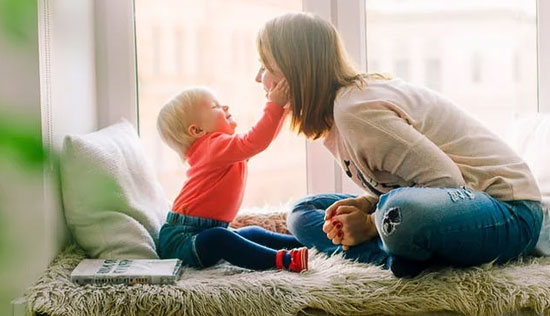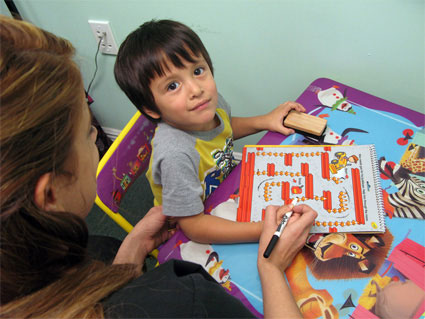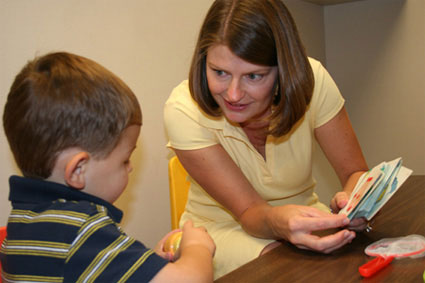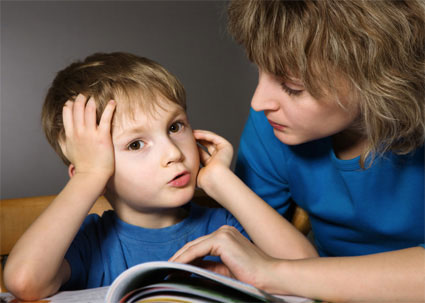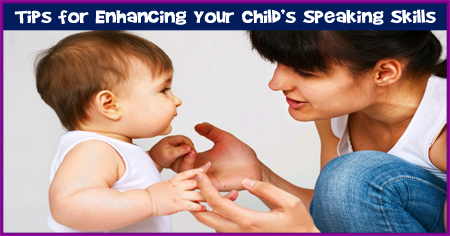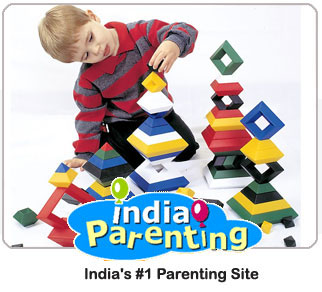Parents of new born babies often ask When will my baby start talking or want to know at what age do babies start talking. First words of a baby are special and are unforgettable memories for parents. Read about when do babies generally start talking and by what age do babies start talking in sentences.Parents of new born babies are always excited about so many things. They are curious about so many issues related to their baby. One important issue most new parents often have on their mind is When will my baby start talking? For a long time, your baby’s mode of communication will be crying. Sometimes you feel helpless when you can’t understand what your baby needs. Once they start talking, even if it’s in broken words and sentences, you will be able to understand their feelings better. A babys receptive language develops first before his expressive language. This means, whatever words you are talking to your baby, he is absorbing it first. Whatever you are speaking to him is going into his vocabulary. Receptive language or what your baby understands develops first before expressive language which is what he expresses to you. In this articleBabies up to Three Months4 to 6 months7 to 12 monthsBabys first wordsTalking and Developmental MilestonesHow Parents can help to make their Babies talkWhen to be concerned?How Speech Delay HappensDo Children who are Late Talkers Catch Up on their own?Things to avoid when a child is figuring out how to talkBabies up to Three MonthsOne of the first ways by which babies communicate with their parents is by crying. Crying may not seem like language development, but it is through crying that your baby is trying to tell you something. Sometimes you may notice that your child has a different type of cry for communicating different things.4 to 6 monthsAt this stage, babies may start what is known as babbling. They might make sounds using vowels. Sounds like Ooh and Aah. Soon, you might start hearing them combine vowels and consonants to say sounds like Da-Da and Ba-Ba. At this age, babies may respond to you by smiling and cooing. This is their way of communicating to you.7 to 12 monthsYour babys receptive language will really start to increase by now. He will be able to understand simple directions like no-no. Many parents like their baby to say bye-bye or blow flying kisses. Your baby will be able to blow kisses and say bye-bye at this age. If you observe your baby carefully, you will see that he tries to imitate your sounds and gestures. This time is exciting for parents because at this age children are expected to say their first words soon.Babys first wordsBabies will most likely say their first words sometime between the ages of 11 to 14 months. By the time they are around 18 months, you can expect them to start saying up to twenty words.By the age of four your child will be chattering away and telling you all sorts of things. It will be fun to hear how he played with the dog to how he won that race with his friend. You would have been waiting eagerly all this time for your child to talk. This age is really a lot of fun. Children say all kinds of funny things.However, not all babies grow at the same pace. If you ask a group of mothers of babies about when their baby started talking, you would probably get a different set of answers from them. Even babies from the same family need not necessarily start talking at the same age.Talking and Developmental MilestonesAt the point when your infant begins "talking," he or she is parading his or her sprouting language abilities. Without a doubt, you dont have any clue about what he or she is saying, yet this gibberish will in the long run lead to genuine words. His or her babble likewise gives you a look into his or her intellectual turn of events, as he or she remembers and rehashes sounds, sets aside some effort to consider what he or she needs to "state," and figures out how to utilize verbal and nonverbal activities to communicate his or her needs and wants.Theres a social segment to jabbering babbling, as well. Way before he or she says a word, your baby learns the guidelines of language and socialization by watching you. He or she perceives how you respond to his or her sounds, and he or she sees how you alternate chatting with conversational accomplices. Infants are designed to learn language and copy how others connect verbally with them.How Parents can help to make their Babies talkTake part in a discussion by conversing with your infantDelay after you state something with the goal that he has the opportunity to process your words and "react"Utilize various tones and syllables when you talk so he will attempt to copy you and learn new soundsDisclose your childs jibber jabber to him. In the event that he says "mama ba" while glancing around, you may state, "oh, would you say you are searching for your container? Where did the container go?"Keep talking to your baby all through the day. For example if you are putting his shoes say "Mummy is putting your shoes". If you are putting your baby on the pram, say "Ok, so now Mummy is putting you on your pram." In this way you are helping him to expand his vocabulary and learn new words.Imitate your baby when he makes those baby noises. If he says Ooh and Aah imitate him. Imitate the little one and encourage him to imitate you. Try to smile when he smiles and laugh when he laughs.Read out to your baby from first word books. These books are a great way to teach your baby new words. He might not be able to say the words immediately. Initially, he may be able to point out the words in the book before being able to say them.When to be concerned?Remember, that at times even the most gifted kids start talking late. The development of your babys learning and speech skills are affected by their health state, nutrition and even emotional factors. Even social and emotional environment plays an important role in the growth and development of babies.Babies generally begin babbling by the time they turn one. If your baby is not babbling even by the time of first birthday, you should see a doctor.See how your baby is responding to sounds. If he does not respond at the sound of his name being called, or if he does not turn his head when there is a loud sound or if you are having certain doubts about something not being okay talk to your doctor.If your baby is not saying anything by the time of 16 months, you can discuss it with the doctor. However, even some perfectly hale and hearty babies do not start talking till the time of two years.Still, if you have some concerns about your childs speech and language development, you should definitely discuss it with your doctor.How Speech Delay HappensIts likewise the situation, be that as it may, that children may begin talking late in spite of a great deal of parental commitment. Postponements can be brought about by any number of components. An excess of screen time, for instance, can prompt deferred verbal discourse. Guardians can without much of a stretch stay away from that issue. Others arent so basic.Different factors outside of parental impact that decide vocabulary, pronunciation and language procurement may incorporate physical difficulties, for example, huge ankyloglossia (silence), cleft lip or palate and other basic issues of the mouth. Hearing is additionally indispensable to language advancement, and all infants ought to be screened for hearing misfortune during childbirth and observed by their pediatrician at all well-checks.Hearing misfortune might be because of an inborn condition, or an ailment, for example, measles, chickenpox, or this seasons flu virus. Head wounds may likewise cause hearing misfortune. Indeed, even regular ear contaminations may cause a development of aggravation and liquid behind the eardrum that straightforwardly impacts a kids discourse and language advancement.Discourse and language deferrals can likewise be because of difficulties like chemical imbalance range issue (ASD) and formative postponements. On the off chance that an infant hasnt began talking by a year, it isnt really cause for concern, yet guardians or parents ought to examine any worries about their youngsters advancement with their pediatrician.Do Children who are Late Talkers Catch Up on their own?Since this gathering of youngsters is advancing so well in different regions of advancement, guardians and others may expect that they will get up to speed with their own. In reality, numerous late talkers do "develop out of it", however many dont. It tends to be hard to anticipate which youngster wont get up to catch up to their friends. In any case, a rundown of hazard factors has been distinguished, which propose that a youngster is bound to have proceeding with language challenges.These include:Quiet as a baby; little chatteringA background marked by ear diseasesLimited number of consonant sounds (eg. p, b, m, t, d, n, y, k, g, and so on.)Doesnt connect imagined thoughts and activities together while playingDoesnt emulate (duplicate) wordsUtilizes for the most part things (names of individuals, spots, things), and barely any action words (activity words)Trouble playing with peers (social aptitudes)A family ancestry of correspondence postponement, learning or scholastic challengesA mellow appreciation (understanding) delay for their ageUtilizes scarcely any motions to conveyOn the off chance that a little child has a constrained vocabulary for his age and any of the above hazard factors, we suggest counseling a discourse language pathologist. Kids who exhibit the last three hazard factors above (family ancestry, perception issues, or not many signals) are at most serious hazard for a proceeding with language delay. Rather than embracing a "how about we keep a watch out" approach, studies suggest finding support for babies who are late to talk as right on time as could be expected under the circumstances.Shouldnt something be said about the late talkers who appear to get up on their own and speed up without mediation or help? Despite the fact that a huge level of these youngsters seem to get up to speed to their friends when they enter school, examines are indicating that this gathering of kids dont proceed just as their companions in specific parts of language utilize, for example, language unpredictability and complexity and sentence structure. In this way, studies suggest mediation for all little children introducing as Late Talkers, so as to forestall further language challenges later on.Things to avoid when a child is figuring out how to talkBackground noise of disturbance – children are handily diverted, so switch off the TV and radio, and let your infant center around what youre stating.Limit the screen time – specialists contend that kids younger than two shouldnt sit in front of the TV. Exploration has discovered that sitting in front of the TV can detrimentally affect language advancement.Rectification – as your child learns new words, he/she will undoubtedly commit a couple of errors. He/she may call all birds dodos, or refer to all youngsters as a particular gender. In time, through tuning in to you and others talk, He/she will figure out how to distinguish between the distinctive subcategories, however until further notice, dont correct him/her time and again as it very well may be debilitating.When do babies start talking? How do they learn to talk? Do you need to worry if your baby is a late talker? As parents, how to help your baby talk? What are the things you must avoid doing when your baby is figuring out how to talk? Discuss here.
Parents of new born babies often ask 'When will my baby start talking' or want to know at what age do babies start talking. First words of a baby are special and are unforgettable memories for parents. Read about when do babies generally start talking and by what age do babies start talking in sentences.Parents of new born babies are always excited about so many things. They are curious about so many issues related to their baby. One important issue most new parents often have on their mind is 'When will my baby start talking?' For a long time, your baby’s mode of communication will be crying. Sometimes you feel helpless when you can’t understand what your baby needs. Once they start talking, even if it’s in broken words and sentences, you will be able to understand their feelings better.
A baby's receptive language develops first before his expressive language. This means, whatever words you are talking to your baby, he is absorbing it first. Whatever you are speaking to him is going into his vocabulary. Receptive language or what your baby understands develops first before expressive language which is what he expresses to you.
Babies up to Three Months
One of the first ways by which babies communicate with their parents is by crying. Crying may not seem like language development, but it is through crying that your baby is trying to tell you something. Sometimes you may notice that your child has a different type of cry for communicating different things.
4 to 6 months
At this stage, babies may start what is known as babbling. They might make sounds using vowels. Sounds like 'Ooh' and 'Aah'. Soon, you might start hearing them combine vowels and consonants to say sounds like 'Da-Da' and 'Ba-Ba.' At this age, babies may respond to you by smiling and cooing. This is their way of communicating to you.
7 to 12 months
Your baby's receptive language will really start to increase by now. He will be able to understand simple directions like no-no. Many parents like their baby to say bye-bye or blow flying kisses. Your baby will be able to blow kisses and say bye-bye at this age. If you observe your baby carefully, you will see that he tries to imitate your sounds and gestures. This time is exciting for parents because at this age children are expected to say their first words soon.
Baby's first words
Babies will most likely say their first words sometime between the ages of 11 to 14 months. By the time they are around 18 months, you can expect them to start saying up to twenty words.
By the age of four your child will be chattering away and telling you all sorts of things. It will be fun to hear how he played with the dog to how he won that race with his friend. You would have been waiting eagerly all this time for your child to talk. This age is really a lot of fun. Children say all kinds of funny things.
However, not all babies grow at the same pace. If you ask a group of mothers of babies about when their baby started talking, you would probably get a different set of answers from them. Even babies from the same family need not necessarily start talking at the same age.
Talking and Developmental Milestones
At the point when your infant begins "talking," he or she is parading his or her sprouting language abilities. Without a doubt, you don't have any clue about what he or she is saying, yet this gibberish will in the long run lead to genuine words. His or her babble likewise gives you a look into his or her intellectual turn of events, as he or she remembers and rehashes sounds, sets aside some effort to consider what he or she needs to "state," and figures out how to utilize verbal and nonverbal activities to communicate his or her needs and wants.
There's a social segment to jabbering babbling, as well. Way before he or she says a word, your baby learns the guidelines of language and socialization by watching you. He or she perceives how you respond to his or her sounds, and he or she sees how you alternate chatting with conversational accomplices. Infants are designed to learn language and copy how others connect verbally with them.
How Parents can help to make their Babies talk
Take part in a discussion by conversing with your infant
Delay after you state something with the goal that he has the opportunity to process your words and "react"
Utilize various tones and syllables when you talk so he will attempt to copy you and learn new sounds
Disclose your child's jibber jabber to him. In the event that he says "mama ba" while glancing around, you may state, "oh, would you say you are searching for your container? Where did the container go?"
Keep talking to your baby all through the day. For example if you are putting his shoes say "Mummy is putting your shoes". If you are putting your baby on the pram, say "Ok, so now Mummy is putting you on your pram." In this way you are helping him to expand his vocabulary and learn new words.
Imitate your baby when he makes those baby noises. If he says 'Ooh' and 'Aah' imitate him. Imitate the little one and encourage him to imitate you. Try to smile when he smiles and laugh when he laughs.
Read out to your baby from first word books. These books are a great way to teach your baby new words. He might not be able to say the words immediately. Initially, he may be able to point out the words in the book before being able to say them.
When to be concerned?
Remember, that at times even the most gifted kids start talking late. The development of your baby's learning and speech skills are affected by their health state, nutrition and even emotional factors. Even social and emotional environment plays an important role in the growth and development of babies.
Babies generally begin babbling by the time they turn one. If your baby is not babbling even by the time of first birthday, you should see a doctor.
See how your baby is responding to sounds. If he does not respond at the sound of his name being called, or if he does not turn his head when there is a loud sound or if you are having certain doubts about something not being okay talk to your doctor.
If your baby is not saying anything by the time of 16 months, you can discuss it with the doctor. However, even some perfectly hale and hearty babies do not start talking till the time of two years.
Still, if you have some concerns about your child's speech and language development, you should definitely discuss it with your doctor.
How Speech Delay Happens
It's likewise the situation, be that as it may, that children may begin talking late in spite of a great deal of parental commitment. Postponements can be brought about by any number of components. An excess of screen time, for instance, can prompt deferred verbal discourse. Guardians can without much of a stretch stay away from that issue. Others aren't so basic.
Different factors outside of parental impact that decide vocabulary, pronunciation and language procurement may incorporate physical difficulties, for example, huge ankyloglossia (silence), cleft lip or palate and other basic issues of the mouth. Hearing is additionally indispensable to language advancement, and all infants ought to be screened for hearing misfortune during childbirth and observed by their pediatrician at all well-checks.
Hearing misfortune might be because of an inborn condition, or an ailment, for example, measles, chickenpox, or this season's flu virus. Head wounds may likewise cause hearing misfortune. Indeed, even regular ear contaminations may cause a development of aggravation and liquid behind the eardrum that straightforwardly impacts a kid's discourse and language advancement.
Discourse and language deferrals can likewise be because of difficulties like chemical imbalance range issue (ASD) and formative postponements. On the off chance that an infant hasn't began talking by a year, it isn't really cause for concern, yet guardians or parents ought to examine any worries about their youngster's advancement with their pediatrician.
Do Children who are Late Talkers Catch Up on their own?
Since this gathering of youngsters is advancing so well in different regions of advancement, guardians and others may expect that they will get up to speed with their own. In reality, numerous late talkers do "develop out of it", however many don't. It tends to be hard to anticipate which youngster won't get up to catch up to their friends. In any case, a rundown of hazard factors has been distinguished, which propose that a youngster is bound to have proceeding with language challenges.
These include:- Quiet as a baby; little chattering
- A background marked by ear diseases
- Limited number of consonant sounds (eg. p, b, m, t, d, n, y, k, g, and so on.)
- Doesn't connect imagined thoughts and activities together while playing
- Doesn't emulate (duplicate) words
- Utilizes for the most part things (names of individuals, spots, things), and barely any action words (activity words)
- Trouble playing with peers (social aptitudes)
- A family ancestry of correspondence postponement, learning or scholastic challenges
- A mellow appreciation (understanding) delay for their age
- Utilizes scarcely any motions to convey
On the off chance that a little child has a constrained vocabulary for his age and any of the above hazard factors, we suggest counseling a discourse language pathologist. Kids who exhibit the last three hazard factors above (family ancestry, perception issues, or not many signals) are at most serious hazard for a proceeding with language delay. Rather than embracing a "how about we keep a watch out" approach, studies suggest finding support for babies who are late to talk as right on time as could be expected under the circumstances.
Shouldn't something be said about the late talkers who appear to get up on their own and speed up without mediation or help? Despite the fact that a huge level of these youngsters seem to get up to speed to their friends when they enter school, examines are indicating that this gathering of kids don't proceed just as their companions in specific parts of language utilize, for example, language unpredictability and complexity and sentence structure. In this way, studies suggest mediation for all little children introducing as Late Talkers, so as to forestall further language challenges later on.
Things to avoid when a child is figuring out how to talk
Background noise of disturbance – children are handily diverted, so switch off the TV and radio, and let your infant center around what you're stating.
Limit the screen time – specialists contend that kids younger than two shouldn't sit in front of the TV. Exploration has discovered that sitting in front of the TV can detrimentally affect language advancement.
Rectification – as your child learns new words, he/she will undoubtedly commit a couple of errors. He/she may call all birds 'dodos', or refer to all youngsters as a particular gender. In time, through tuning in to you and others talk, He/she will figure out how to distinguish between the distinctive subcategories, however until further notice, don't correct him/her time and again as it very well may be debilitating.
When do babies start talking? How do they learn to talk? Do you need to worry if your baby is a late talker? As parents, how to help your baby talk? What are the things you must avoid doing when your baby is figuring out how to talk? Discuss here.












